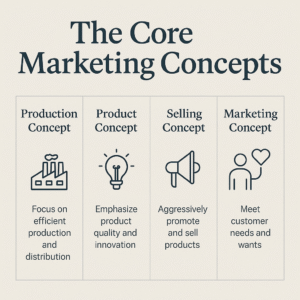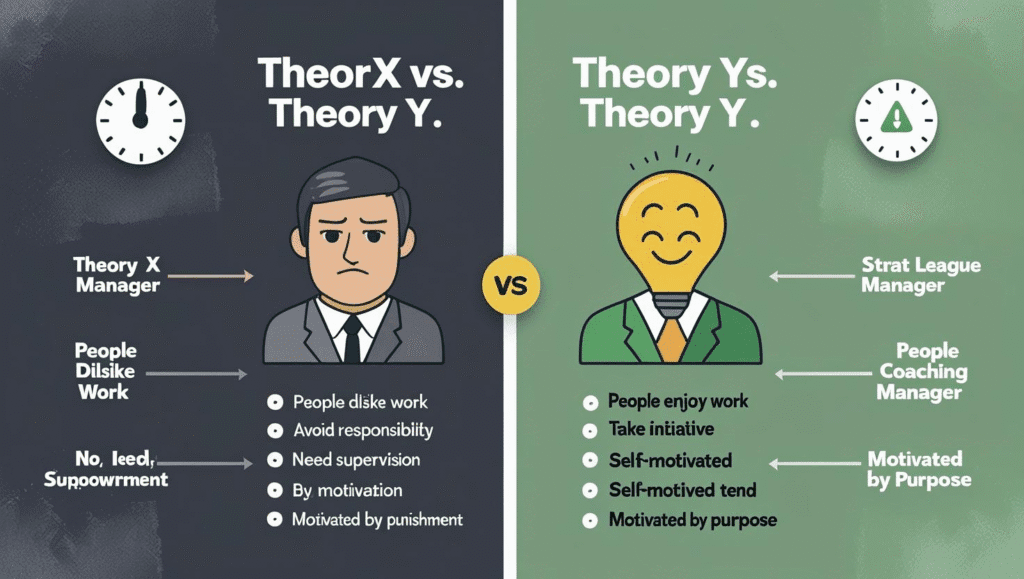The Evolution of Marketing Thought: From Production to Societal Well-being
Modern marketing is deeply customer-centric, but it wasn’t always this way. Business philosophy has evolved through several distinct eras, each with a different focus. Understanding this progression from an internal production mindset to a holistic societal view is crucial for grasping the core of modern marketing strategy.
The Production Concept
Era: ~1860s – 1920sConsumers will favor products that are widely available and inexpensive.
- Focus: High production efficiency, low costs, and mass distribution.
- Motto: “If we make it efficiently, they will buy it.”
- Example: Henry Ford’s Model T car. The focus was on perfecting the assembly line to make the car affordable for the masses, not on customer choice.
The Product Concept
Era: ~1920s – 1950sConsumers will favor products offering the most quality, performance, and innovative features.
- Focus: Superior product engineering and continuous feature improvement.
- Motto: “Build a better mousetrap, and the world will beat a path to your door.”
- Risk: Can lead to “marketing myopia”—focusing on the product itself rather than the customer need it fulfills.
The Selling Concept
Era: ~1950s – 1970sConsumers won’t buy enough unless the firm undertakes a large-scale selling and promotion effort.
- Focus: Aggressive sales tactics and heavy promotion to sell what the company makes.
- Motto: “Sell, sell, sell! The goal is to move inventory.”
- Example: Often used for “unsought goods” like life insurance or encyclopedia sets, where the focus is on persuasion rather than pre-existing demand.
The Marketing Concept
Era: ~1970s – 2000sSuccess depends on knowing the needs and wants of target markets and delivering satisfaction better than competitors.
- Focus: Customer needs, market research, and integrated marketing efforts.
- Motto: “Don’t find customers for your products; find products for your customers.”
- Example: Amazon’s relentless focus on customer convenience and personalization.
The Societal Marketing Concept
Era: ~2000s – PresentDeliver value to customers in a way that maintains or improves both the consumer’s and society’s well-being.
- Focus: Balancing three things: company profits, consumer wants, and society’s interests (sustainability, ethics).
- Motto: “Marketing with a conscience.”
- Example: Patagonia building high-quality gear while advocating for environmental preservation and sustainable practices.
Summary of Marketing Concepts
| Concept | Focus | Motto / Guiding Principle |
|---|---|---|
| Production | Efficiency & Mass Distribution | “Make it cheap and available.” |
| Product | Quality & Features | “Build the best product.” |
| Selling | Aggressive Promotion | “Push the product hard.” |
| Marketing | Customer Needs & Wants | “Serve the customer’s needs.” |
| Societal | Customer Needs & Society’s Well-being | “Serve needs responsibly.” |
Frequently Asked Questions
What is “marketing myopia”?
Marketing myopia is a short-sighted focus on the product itself rather than the benefit or need it fulfills for the customer. It’s a risk of the Product Concept, where a company might perfect a product (like slide rules) that becomes obsolete as customer needs are met by new technologies (like electronic calculators).
Which marketing concept is best?
For most modern businesses, the Marketing Concept is the foundation for success. The Societal Marketing Concept is considered an even more advanced and responsible approach that builds long-term brand equity and resilience in today’s socially conscious world.
Can a company use more than one concept at the same time?
While a company’s overarching philosophy should be modern (Marketing or Societal), elements of other concepts can still apply in specific situations. For example, a commodity business might still focus heavily on Production Concept principles (efficiency), or a division might use Selling Concept tactics for a short-term promotion.


